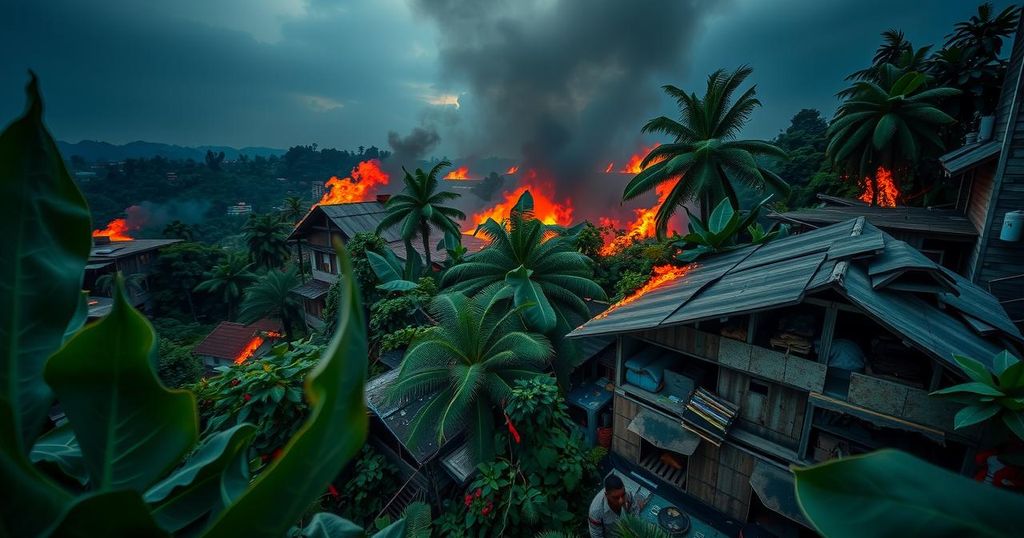Concerns Over Constitutional Changes in the Democratic Republic of Congo

The Democratic Republic of Congo is facing rising citizen distrust amidst President Felix Tshisekedi’s proposal to amend the constitution since his re-election. With widespread challenges such as poverty, insecurity, and health crises, many fear his intentions may be self-serving, aimed at altering presidential term limits. This echoes past attempts by former President Joseph Kabila, raising concerns of political distraction from critical issues affecting Congolese citizens.
The political landscape in the Democratic Republic of Congo (DRC) is currently marked by deepening mistrust among citizens regarding governmental intentions, particularly in light of President Felix Tshisekedi’s recent focus on amending the constitution. As one of the poorest countries globally, the DRC grapples with severe challenges, including insecurity, widespread displacement, food insecurity impacting over twenty-three million individuals, and the ongoing threat posed by a devastating Mpox outbreak. Despite these pressing issues, Tshisekedi’s administration has displayed minimal progress since his contentious rise to power in 2018. Following his re-election in a contested electoral process in 2023, he has turned his attention to revising the constitution, deeming the existing framework—established through a 2005 referendum— as obsolete and purportedly imposed by foreign influences. His proposal to create a national commission for this purpose raises suspicions among many Congolese who fear that the real objective is to alter presidential term limits, thereby potentially allowing him to extend his presidency before the conclusion of what should be his final term. This scenario echoes the past, as Tshisekedi’s predecessor Joseph Kabila similarly endeavored to alter constitutional provisions, eventually extending his time in office beyond his mandate, a move that triggered significant public backlash and political instability. Despite historical precedence illustrating the risks of circumventing term limits, Tshisekedi appears undeterred, possibly emboldened by the support of foreign powers eager to exploit the DRC’s vast mineral resources. This dynamic may facilitate a lack of international accountability for Tshisekedi’s actions, further exacerbating the fragility of a nation whose citizens are already facing dire circumstances without the distraction of political maneuvering. In conclusion, the current constitutional reform initiative in the DRC presents a troubling development amidst ongoing humanitarian crises. The government’s focus on potential term extension amid widespread citizen discontent raises concerns about the integrity of democratic processes in the country. The international community must tread carefully, given the complexities involved in engaging with a leadership that may prioritize self-serving interests over the pressing needs of the Congolese people.
The Democratic Republic of Congo stands as a nation rich in natural resources yet plagued by dire socio-economic challenges, rendering it one of the poorest countries in the world. This juxtaposition highlights the pervasive insecurity in the eastern regions, where armed groups operate freely, and many citizens are forcibly displaced. These hardships are compounded by food insecurity and health crises, exemplified by the recent outbreak of Mpox. Under such bleak conditions, the government, led by President Felix Tshisekedi, faces serious scrutiny regarding its effectiveness and intentions, particularly concerning constitutional changes amid allegations of democratic erosion and self-serving political agendas.
The ongoing political maneuvers surrounding constitutional amendments in the DRC underscore a critical need for transparency and accountability. As the nation grapples with a myriad of socio-economic hardships, any distraction from substantive governance only serves to alienate an increasingly disenchanted populace. It is imperative for both domestic and international stakeholders to recognize the gravity of these developments, understanding that the integrity of democratic structures is essential to the DRC’s stability and future prosperity.
Original Source: www.africa.com







